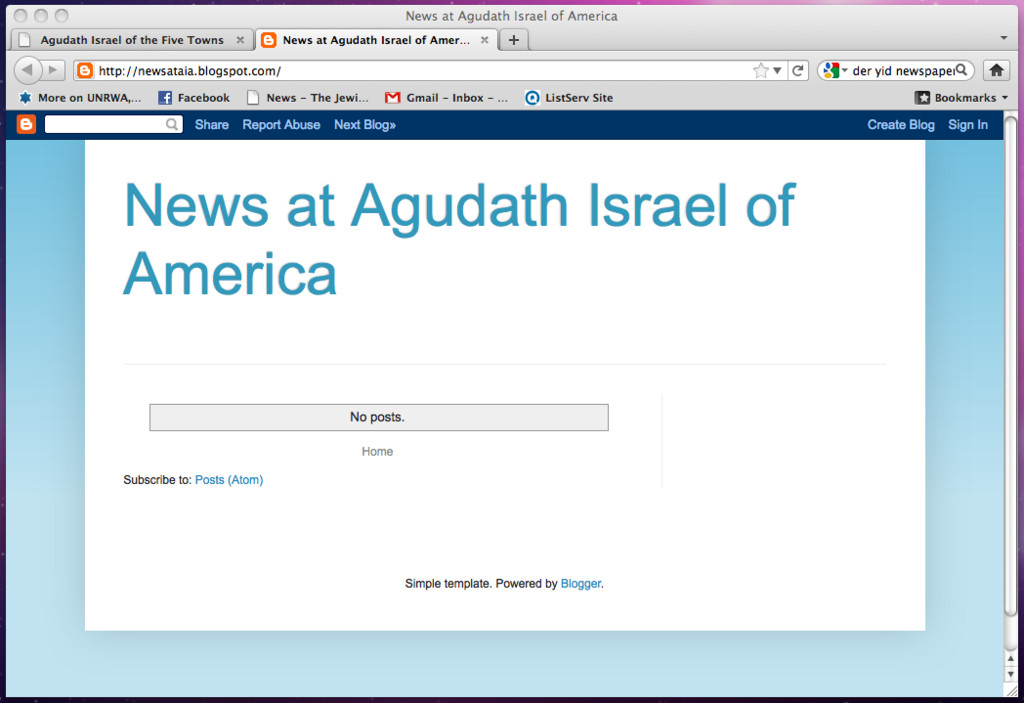Agudath de-blogs
Haredi Internet debate
It came down within hours of its posting, but as word got out, the material that appeared on the short-lived Agudath Israel of America news blog, continues to resonate online. On May 25, Leah Zagelbaum, the organization’s communications director, launched the blog, using it to share photographs, press releases, and event information. Within hours, the post was removed, pending a review by the Moetzes Gedolei HaTorah, the rabbinic board that has the final word in Agudath Israel.
“So, it’s clear that this blog is all about news at Agudath Israel of America,” Zagelbaum wrote. “I’ll be posting press releases, pictures and information about Agudah activities. I’m hoping this will be a forum for sharing breaking news, interesting events and important statements.”
The blog bucked the organization’s longstanding policy of shunning the Internet in a time when other major Orthodox organizations have used the web as a communications tool.
“It’s in their interest to have an online presence, said Ezra Friedlander, an executive of the Friedlander PR Group. “But how can their rabbinic leadership sanction something that is not kosher?” Friedlander said that while the blog did not allow for comments to be posted, the organization’s main concern is keeping control of its message, which can get picked up by other sites even after it is erased. For now, Agudath Israel spreads its messages mainly through emails.
“Ours may be a clunky system, but we manage to get information out to the public through press releases and the reports that result in newspapers from our interactions with the media,” said Rabbi Avi Shafran, the organization’s public affairs director. “Members not only of the press but also the public know that I am always available to respond to questions about our positions or activities.”
While the rabbinic board has previously expressed vehement opposition to unfiltered Internet usage, an example from the early days of Agudath Israel could provide a clue to its decision on the Internet. At the time of its founding in 1912, most Yiddish and Hebrew newspapers were secular, and often hostile to Orthodox interests. To counter their influence, the rabbis endorsed the European forerunner of the Hamodia newspaper to promote the Agudath Israel viewpoint. Rabbi Shafran said that it is likely that the Moetzei Gedolei will eventually endorse an online presence, but he does not know when this will happen.
“People often forget that there was life before the internet and they have trouble recalling a time when organizations interacted with their members using more conventional modes of communication,” said Aaron Troodler, a public relations consultant in the Orthodox community. “They have to make choices that are in sync with the religious lifestyle that they lead.”
Another example of a tightly controlled online message is the website of Di Tzeitung, the Hasidic Yiddish-language weekly that closely follows the Satmar point of view on news topics. In contrast to its counterparts, Der Yid and Der Blatt, this newspaper keeps a bare bones website with selected pages from its print edition and contact information. “The website is for our income, it has our ads and a few pages, but we don’t take feedback. It’s also for travelers where there are no Yiddish newspapers,” publisher Albert Friedman said.
Another major concern voiced by rabbis is the Internet’s ability to distract. “There is a lot of time-wasting potential on the Internet, not necessarily bad stuff, but we should be focusing on our work,” said Rabbi Mordechai Kamenetzky, principal of Yeshiva of South Shore in Hewlett. “You could forget your focus and lose productivity.”
On the local level, only two Agudath Israel synagogues have websites. The Agudath Israel of West Lawrence website features contact information and recorded audio shiurim from its leader, Rabbi Moshe Brown. The Agudath Israel of the Five Towns, led by Rabbi Yitzchok Frankel, has a more detailed website showing the synagogue’s events, prayer schedule, lectures, and online donation button. “Not everybody gets all the news. This website shows everything that’s happening,” said Woodmere resident Gary Frechter, who attends the Agudath synagogue. “It has all the events posted.”
While holding off on the national level, Agudath is not opposed to its local synagogues keeping websites. “Such things are up to the consciences of the individuals or rabbis,” Rabbi Shafran said. “The issue for us is the inadvertent message that might be sent by Agudath Israel of America, as the national organization that advocates for the haredi community.”

 55.0°,
Fog/Mist
55.0°,
Fog/Mist 




